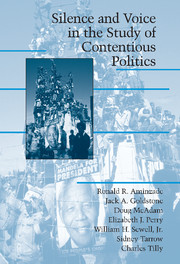Book contents
- Frontmatter
- Contents
- Preface
- 1 SILENCE AND VOICE IN THE STUDY OF CONTENTIOUS POLITICS: INTRODUCTION
- 2 EMOTIONS AND CONTENTIOUS POLITICS
- 3 SPACE IN CONTENTIOUS POLITICS
- 4 IT'S ABOUT TIME: TEMPORALITY IN THE STUDY OF SOCIAL MOVEMENTS AND REVOLUTIONS
- 5 LEADERSHIP DYNAMICS AND DYNAMICS OF CONTENTION
- 6 THE SACRED, RELIGIOUS, AND SECULAR IN CONTENTIOUS POLITICS: BLURRING BOUNDARIES
- 7 THREAT (AND OPPORTUNITY): POPULAR ACTION AND STATE RESPONSE IN THE DYNAMICS OF CONTENTIOUS ACTION
- 8 CONTENTION IN DEMOGRAPHIC AND LIFE-COURSE CONTEXT
- 9 HARMONIZING THE VOICES: THEMATIC CONTINUITY ACROSS THE CHAPTERS
- References
- Index
4 - IT'S ABOUT TIME: TEMPORALITY IN THE STUDY OF SOCIAL MOVEMENTS AND REVOLUTIONS
Published online by Cambridge University Press: 05 June 2012
- Frontmatter
- Contents
- Preface
- 1 SILENCE AND VOICE IN THE STUDY OF CONTENTIOUS POLITICS: INTRODUCTION
- 2 EMOTIONS AND CONTENTIOUS POLITICS
- 3 SPACE IN CONTENTIOUS POLITICS
- 4 IT'S ABOUT TIME: TEMPORALITY IN THE STUDY OF SOCIAL MOVEMENTS AND REVOLUTIONS
- 5 LEADERSHIP DYNAMICS AND DYNAMICS OF CONTENTION
- 6 THE SACRED, RELIGIOUS, AND SECULAR IN CONTENTIOUS POLITICS: BLURRING BOUNDARIES
- 7 THREAT (AND OPPORTUNITY): POPULAR ACTION AND STATE RESPONSE IN THE DYNAMICS OF CONTENTIOUS ACTION
- 8 CONTENTION IN DEMOGRAPHIC AND LIFE-COURSE CONTEXT
- 9 HARMONIZING THE VOICES: THEMATIC CONTINUITY ACROSS THE CHAPTERS
- References
- Index
Summary
The title of this volume is Silence and Voice in the Study of Contentious Politics. This title is meant to signify that we are not simply interested in noting and articulating that which has been left out of the study of social movements, revolutions, and the like, but in relating these “silences” to the dominant “voices”; those topics, concepts, and theories that have set the intellectual agenda in recent years in the various fields that comprise the study of political contention. Necessarily, however, most of the chapters are focused on a topical silence, with the relationship between the topic and the dominant lines of theory and research addressed only briefly, if at all, in the chapter.
The case of temporality is a bit different, however, from most of the other topics addressed in the individual chapters. It is not that the general topic has been ignored, but that specific temporal rhythms have been emphasized at the expense of others. In this chapter, then, we will devote nearly as much space to a discussion of the dominant conceptions of temporality as to the temporal rhythms that have gone largely unexamined in the study of contention. In this chapter we hope to do four things in particular. First, we will briefly highlight the two temporal rhythms that have dominated the study of social movements and revolutions. Second, we will take up two other rarely studied temporalities that strike us as highly relevant to an understanding of the emergence, development, and decline of political contention.
- Type
- Chapter
- Information
- Silence and Voice in the Study of Contentious Politics , pp. 89 - 125Publisher: Cambridge University PressPrint publication year: 2001
- 141
- Cited by



